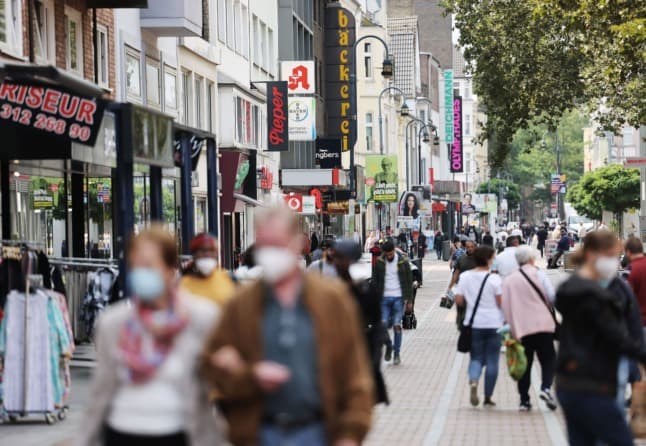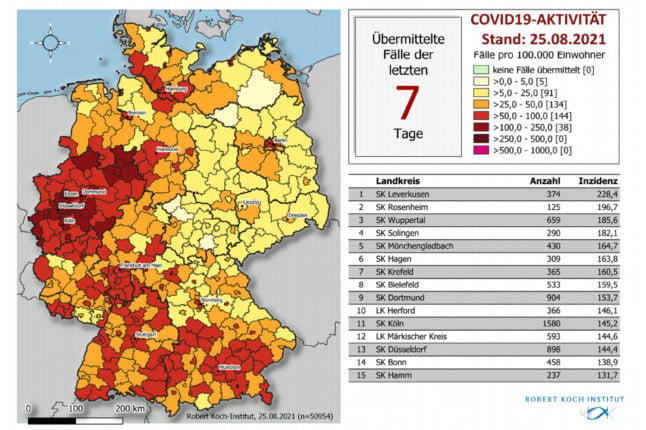EXPLAINED: These are Germany's current Covid hotspots

The fourth wave of the coronavirus pandemic is starting to gain steam in Germany. Which districts of the country are worst affected?
The latest figures published by the Robert Koch Institute (RKI) this Wednesday show the highest levels of coronavirus infection since late May, with 11,500 new positive cases recorded in one day.
At the same time the government’s new measure for assessing the severity of the pandemic - hospitalisations per 100,000 people - has risen from 1.19 a week ago to 1.47 today. At the height of the crisis last winter that figure was estimated to be around 12.
The rise in cases in this fourth wave of the virus is not spread evenly over the country, though. These are the areas that are the current hotspots.
North-Rhine Westphalia
The country’s most populous state is the current focal point of the fourth wave, with the city of Leverkusen having a 7-day incidence of 228, making it the place with the most severe outbreak in the country.
Several other cities in the western state are also at the top of the chart published by the RKI that breaks down the country into its roughly 300 districts.

Wuppertal and Solingen both have 7-day incidences over 180, while Mönchengladbach, Dortmund and Hagen have incidences above 150.
Cologne and Düsseldorf, the state’s two major cities, have incidences of over 140.
The steep rise in cases in the west of the country is already being seen in higher intensive care occupancy.
In Leverkusen, eight beds on the city’s intensive care wards are currently taken up by Covid patients - that’s 15 percent of the city’s total ICU capacity.
In the metropole of Cologne, 29 beds on the intensive care ward are now occupied by Covid patients.
The south west
The small state of Saarland on the French border has the next highest level of infection after NRW, with a current 7-day incidence of 71 cases per 100,000 people.
Currently though the level of hospitalisation in the rural state remains relatively low, with just 10 of the 166 ICU beds in state capital Saarbrücken occupied by Covid patients.
Die Welt newspaper's Covid watcher, Olaf Gersemann, points out that the incidence has been rising in the south west as a whole, with Baden-Württemberg, Hesse, and Rhineland-Palatinate all now recording 7-day incidences above 50.
Die vierte Welle erreicht den Südwesten:
Die #Corona-Inzidenz steigt auch in #BadenWuerttemberg auf über 50, nämlich auf 53 - fünf Tage nach #Hessen (61) und einen Tag nach #RheinlandPfalz (54).#Bayern (49,6) ist der 50er-Schwelle auch schon nahe.@welt pic.twitter.com/hFX9Ut2YEi
— Olaf Gersemann (@OlafGersemann) August 25, 2021
Bavaria
Over 6,500 new cases of Covid have been reported in Germany’s large southeastern state over the past week.
The city of Rosenheim has the second worst outbreak in the country, with a current 7-day incidence of 197 cases per 100,000 people. Currently 20 percent of its ICU beds are taken up by Covid patients.
State capital Munich has a 7-day incidence of 60, which roughly equates to the national average.
The city states
The major city states of Hamburg and Berlin both saw a rapid increase in cases in the first half of August. The good news is that case numbers in both cities have now started to fall.
Hamburg has a current 7-day incidence of 68 while Berlin stands at 67.
READ MORE: 3G to 2G - Hamburg venues can allow entry for Covid-vaccinated and recovered people only
Where are cases low?
The east of the country, which was so badly hit by the pandemic over the winter, currently has very low levels of infection.
Saxony, which has recorded the highest number of deaths in relation to its population, currently has a 7-day incidence of just 16. Similarly neighbouring Thuringia has an incidence of 14.
And the two northern states of Mecklenburg-Western Pomerania and Schleswig-Holstein, both of which have avoided the worst of the pandemic, continue to record relatively low levels of infection.
SEE ALSO: Can visitors to Germany still get free Covid tests under new rules?
Comments
See Also
The latest figures published by the Robert Koch Institute (RKI) this Wednesday show the highest levels of coronavirus infection since late May, with 11,500 new positive cases recorded in one day.
At the same time the government’s new measure for assessing the severity of the pandemic - hospitalisations per 100,000 people - has risen from 1.19 a week ago to 1.47 today. At the height of the crisis last winter that figure was estimated to be around 12.
The rise in cases in this fourth wave of the virus is not spread evenly over the country, though. These are the areas that are the current hotspots.
North-Rhine Westphalia
The country’s most populous state is the current focal point of the fourth wave, with the city of Leverkusen having a 7-day incidence of 228, making it the place with the most severe outbreak in the country.
Several other cities in the western state are also at the top of the chart published by the RKI that breaks down the country into its roughly 300 districts.

Wuppertal and Solingen both have 7-day incidences over 180, while Mönchengladbach, Dortmund and Hagen have incidences above 150.
Cologne and Düsseldorf, the state’s two major cities, have incidences of over 140.
The steep rise in cases in the west of the country is already being seen in higher intensive care occupancy.
In Leverkusen, eight beds on the city’s intensive care wards are currently taken up by Covid patients - that’s 15 percent of the city’s total ICU capacity.
In the metropole of Cologne, 29 beds on the intensive care ward are now occupied by Covid patients.
The south west
The small state of Saarland on the French border has the next highest level of infection after NRW, with a current 7-day incidence of 71 cases per 100,000 people.
Currently though the level of hospitalisation in the rural state remains relatively low, with just 10 of the 166 ICU beds in state capital Saarbrücken occupied by Covid patients.
Die Welt newspaper's Covid watcher, Olaf Gersemann, points out that the incidence has been rising in the south west as a whole, with Baden-Württemberg, Hesse, and Rhineland-Palatinate all now recording 7-day incidences above 50.
Die vierte Welle erreicht den Südwesten:
— Olaf Gersemann (@OlafGersemann) August 25, 2021
Die #Corona-Inzidenz steigt auch in #BadenWuerttemberg auf über 50, nämlich auf 53 - fünf Tage nach #Hessen (61) und einen Tag nach #RheinlandPfalz (54).#Bayern (49,6) ist der 50er-Schwelle auch schon nahe.@welt pic.twitter.com/hFX9Ut2YEi
Bavaria
Over 6,500 new cases of Covid have been reported in Germany’s large southeastern state over the past week.
The city of Rosenheim has the second worst outbreak in the country, with a current 7-day incidence of 197 cases per 100,000 people. Currently 20 percent of its ICU beds are taken up by Covid patients.
State capital Munich has a 7-day incidence of 60, which roughly equates to the national average.
The city states
The major city states of Hamburg and Berlin both saw a rapid increase in cases in the first half of August. The good news is that case numbers in both cities have now started to fall.
Hamburg has a current 7-day incidence of 68 while Berlin stands at 67.
READ MORE: 3G to 2G - Hamburg venues can allow entry for Covid-vaccinated and recovered people only
Where are cases low?
The east of the country, which was so badly hit by the pandemic over the winter, currently has very low levels of infection.
Saxony, which has recorded the highest number of deaths in relation to its population, currently has a 7-day incidence of just 16. Similarly neighbouring Thuringia has an incidence of 14.
And the two northern states of Mecklenburg-Western Pomerania and Schleswig-Holstein, both of which have avoided the worst of the pandemic, continue to record relatively low levels of infection.
SEE ALSO: Can visitors to Germany still get free Covid tests under new rules?
Join the conversation in our comments section below. Share your own views and experience and if you have a question or suggestion for our journalists then email us at [email protected].
Please keep comments civil, constructive and on topic – and make sure to read our terms of use before getting involved.
Please log in here to leave a comment.